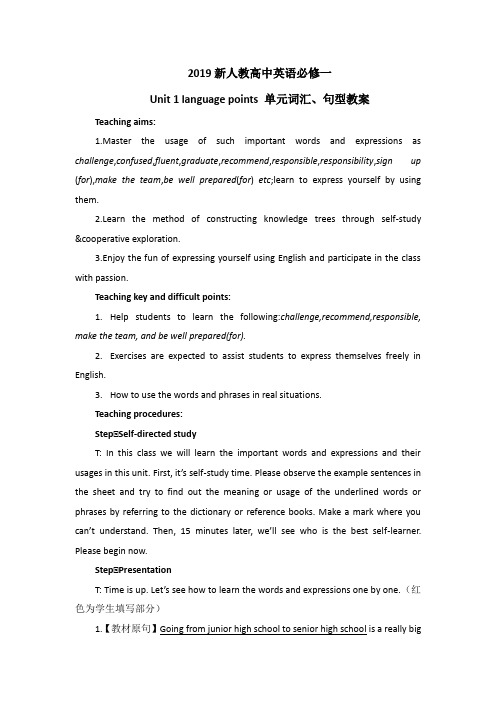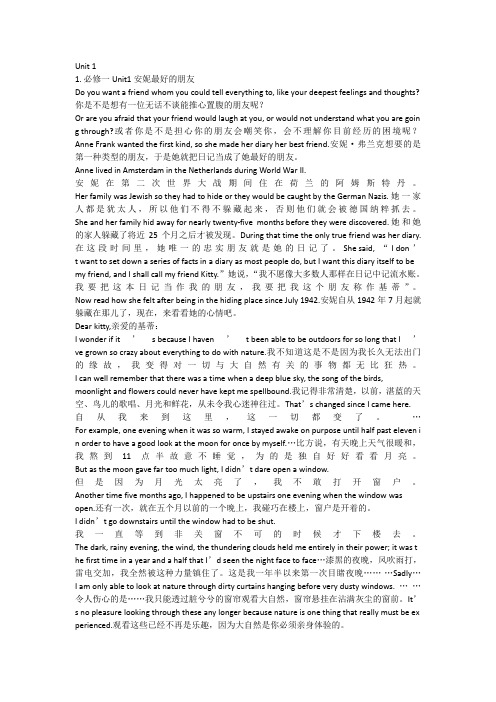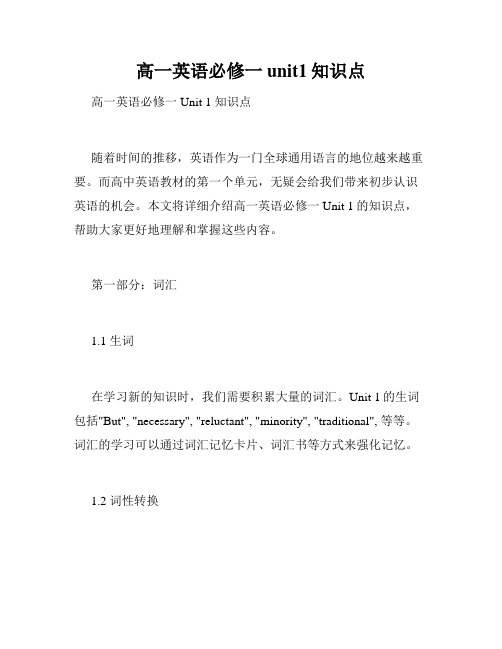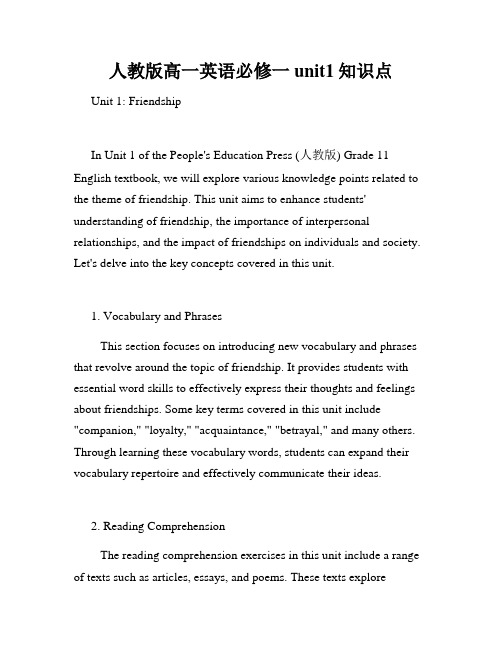人版高中英语必修一Unit1课文语言知识点教学文稿
2019新人教高中英语必修一unit1language points单元词汇句型教案

2019新人教高中英语必修一Unit 1 language points 单元词汇、句型教案Teaching aims:1.Master the usage of such important words and expressions as challenge,confused,fluent,graduate,recommend,responsible,responsibility,sign up (for),make the team,be well prepared(for) etc;learn to express yourself by using them.2.Learn the method of constructing knowledge trees through self-study &cooperative exploration.3.Enjoy the fun of expressing yourself using English and participate in the class with passion.Teaching key and difficult points:1.Help students to learn the following:challenge,recommend,responsible, make the team, and be well prepared(for).2.Exercises are expected to assist students to express themselves freely in English.3.How to use the words and phrases in real situations.Teaching procedures:StepⅠSelf-directed studyT: In this class we will learn the important words and expressions and their usages in this unit. First, it’s self-study time. Please observe the example sentences in the sheet and try to find out the meaning or usage of the underlined words or phrases by referring to the dictionary or reference books. Make a mark where you can’t understand. Then, 15 minutes later, we’ll see who is the best self-learner. Please begin now.StepⅠPresentationT: Time is up. Let’s see how to learn the words and expressions one by one.(红色为学生填写部分)1.【教材原句】Going from junior high school to senior high school is a really bigchallenge.从初中过渡到高中真是一项巨大的挑战。
人教版高中英语必修一unit1-unit5 重要单词、短语及课文详解

1. 必修一Unit1安妮最好的朋友Do you want a friend whom you could tell everything to, like your deepest feelings and thoughts?你是不是想有一位无话不谈能推心置腹的朋友呢?Or are you afraid that your friend would laugh at you, or would not understand what you are goin g through?或者你是不是担心你的朋友会嘲笑你,会不理解你目前经历的困境呢?Anne Frank wanted the first kind, so she made her diary her best friend.安妮·弗兰克想要的是第一种类型的朋友,于是她就把日记当成了她最好的朋友。
Anne lived in Amsterdam in the Netherlands during World War II.安妮在第二次世界大战期间住在荷兰的阿姆斯特丹。
Her family was Jewish so they had to hide or they would be caught by the German Nazis.她一家人都是犹太人,所以他们不得不躲藏起来,否则他们就会被德国纳粹抓去。
She and her family hid away for nearly twenty-five months before they were discovered.她和她的家人躲藏了将近25个月之后才被发现。
During that time the only true friend was her diary.在这段时间里,她唯一的忠实朋友就是她的日记了。
She said, “I don’t want to set down a series of facts in a diary as most people do, but I want this diary itself to be my friend, and I shall call my friend Kitty.”她说,“我不愿像大多数人那样在日记中记流水账。
高一英语必修一unit1知识点

高一英语必修一unit1知识点高一英语必修一Unit 1 知识点随着时间的推移,英语作为一门全球通用语言的地位越来越重要。
而高中英语教材的第一个单元,无疑会给我们带来初步认识英语的机会。
本文将详细介绍高一英语必修一Unit 1的知识点,帮助大家更好地理解和掌握这些内容。
第一部分:词汇1.1 生词在学习新的知识时,我们需要积累大量的词汇。
Unit 1的生词包括"But", "necessary", "reluctant", "minority", "traditional", 等等。
词汇的学习可以通过词汇记忆卡片、词汇书等方式来强化记忆。
1.2 词性转换我们还需要学习词性转换,以用不同的词性来表达不同的含义。
比如,"reluctantly"是"reluctant"的副词形式,"necessity"是"necessary"的名词形式。
第二部分:语法2.1 形容词和副词的比较级和最高级在Unit 1中,我们学习了形容词和副词的比较级和最高级的用法。
比如,在比较两个人或物的不同时,我们可以使用比较级,如"Mary is taller than Tom." 在比较三个或多个人或物时,我们可以使用最高级,如"This is the most interesting book I've ever read."2.2 一般现在时和一般过去时在Unit 1中,我们也学习了一般现在时和一般过去时的用法。
一般现在时用来表达我们常常发生的动作或习惯,如"I usually goto school by bus." 一般过去时则用来表达过去的动作或状态,如"He studied hard last night."第三部分:阅读理解3.1 阅读技巧在英语学习中,我们需要培养良好的阅读理解能力。
人教版必修第一册Unit1Teenagelife单元知识点总结课件

(3) Whether to wear formal clothes or not is under debate.
完成句子
(4) We had a heated debate (一场猛烈的讨论)on the matter.
(5) It is a fact beyond debate pressure of graduates is heavy.
常用于结构:argue sb. into/out of doing sth. 说服某人做 / 不做某事。
单句语法填空
(1)We are having a heated debate on on children.
the effect of computers
(2) We debated with them on the question till late into the night.
单句语法填空
(1)As a matter of fact,I prefer certainty to
adventure.
(2)I prefer to go (go) out and be out.
(3)Most people prefer riding (ride)to work to ____________ (drive)with the free-bicydrcilveingservice offered.
人教版高中英语必修一Unit1知识点讲解

Unit 1 FriendshipNew words:1.add up合计vt. &vi.①a dd up to + No. 总计为Eg: The numbers add up to exactly 666.数字加起来正好是666. vt.Add up all the money I owe you. vt.Eg: The waiter can’t add up. 他不能算账vi.②a dd up....增添The words add up to myself confidence. 你的话语增添了我的信心/自信。
③a dd ..... to .....Eg: Please add the tea to the milk. 把茶加到牛奶里去。
2. ignore vt. 不理睬;忽视means pay no attention to sb/sth on purpose.故意假装不理睬某人Eg:you can not avoid ignoring my advice on how to study English.你耽误不起忽略我的关于英语学习的建议。
She ignored him and carried on with her works. 她假装没看见他,忽略了他,继续做着她手头上的工作。
3. upset adj. 心烦意乱的;不安的;不适的;vt. 使不安;使心烦adj. be upset about : means be unhappy with something and be disappointed Eg: Your parents are upset about your poor grades. 你的父母亲对你的成绩感到非常的难过和不开心。
be upset that + 从句Eg: She was upset that he had left without a kiss.an upset stomach: means your stomach is uncomfortablevt. upset upsettingEg: Your action upset/annoyed me. 你的行为使我很恼火,很恼怒。
人版高中英语必修一Unit1课文语言知识点

Should have done练习
• 用所给动词的适当形式填空
• 1. –I missed the first part of the film. It was really a pity.
• -You
(leave)home an hour earlier.
• 2. I was really anxious about you.
• 强调句:
Reading
• It is/was +被强调部分+that/who+其他成分
• 用来强调除谓语以外的其他成分,如主语、宾语、状语等 • 强调谓语用do、does、did
• Mary lost her watch yesterday.
• It was yesterday that Mary lost her watch.
• The teachers have gone through all the paper of the students.
• 老师们已经批阅了学生们的试卷。 • 3.通过(考试、议案)=get through • He has gone through the exam. 他通过了考试。 • 4.完成,做完
the problem .
• 4. It’s +形容词/名词+连词+名词性从句/to do sth./ doing sth.
• It will become more and more important to have a good knowledge of English .
• It’s a pity that I didn’t think of it earlier. • It’s no use going there so early.
人教版高一英语教材unit1知识点

人教版高一英语教材unit1知识点Unit 1: FriendshipIn the first unit of the People's Education Edition of the Senior High School English Textbook, we explore various aspects of friendship. This unit focuses on introducing key concepts, vocabulary, and grammar related to friendship. Below, we will discuss the knowledge points covered in this unit.1. VocabularyVocabulary plays a crucial role in language acquisition. In this unit, you will encounter words and phrases related to friendship and social relationships. It is essential to familiarize yourself with these terms to enhance your understanding and usage of the English language. Some of the vocabulary words you will encounter include companionship, loyalty, trust, empathy, and support.2. GrammarGrammar serves as a foundation for effective communication. In Unit 1, you will learn and practice various grammatical structures that are commonly used when discussing friendship. These include:a. Comparatives and superlatives: These are used to make comparisons between two or more people or things. For example, "Jane is taller than Sara" or "This is the most beautiful flower."b. Prepositions of time and place: Proper usage of prepositions such as "at," "in," and "on" is essential for indicating time and location accurately. For example, "Let's meet at the park" or "The party is on Saturday."c. Conditional sentences: These are used to express hypothetical situations or consequences. You will learn about different types of conditional sentences such as zero conditionals, first conditionals, and second conditionals. For example, "If it rains, I will bring an umbrella."3. Reading ComprehensionUnit 1 includes various reading passages that focus on friendship and its significance. These passages are designed to improve your reading comprehension skills and help you extract essential information from the text. Pay attention to details, main ideas, and supporting evidence as you engage with these texts.4. Listening SkillsEffective communication involves both speaking and listening. In this unit, you will have the opportunity to practice your listening skills by engaging with dialogues related to friendship. Through these activities, you will develop your ability to understand spoken English and improve your overall listening comprehension.5. Writing ExercisesWriting is an essential skill that allows us to express our thoughts and ideas. In Unit 1, you will be given writing exercises that focus on topics related to friendship. These exercises will require you to express your opinions, share personal experiences, or write about fictional scenarios. Practice these writing tasks to enhance your ability to communicate effectively through writing.6. Speaking ActivitiesUnit 1 also includes speaking activities that encourage students to practice oral communication skills. These activities are designed to promote discussions and interactions among classmates. Engage in group discussions, role plays, and debates to improve your speaking abilities and gain confidence in expressing your ideas verbally.In conclusion, Unit 1 of the People's Education Edition of the Senior High School English Textbook covers various knowledge pointsrelated to friendship. By focusing on vocabulary, grammar, reading comprehension, listening skills, writing exercises, and speaking activities, this unit aims to enhance students' overall English proficiency and foster a deeper understanding of the importance of friendship in our lives.。
人教版高一英语必修一unit1知识点

人教版高一英语必修一unit1知识点Unit 1: FriendshipIn Unit 1 of the People's Education Press (人教版) Grade 11 English textbook, we will explore various knowledge points related to the theme of friendship. This unit aims to enhance students' understanding of friendship, the importance of interpersonal relationships, and the impact of friendships on individuals and society. Let's delve into the key concepts covered in this unit.1. Vocabulary and PhrasesThis section focuses on introducing new vocabulary and phrases that revolve around the topic of friendship. It provides students with essential word skills to effectively express their thoughts and feelings about friendships. Some key terms covered in this unit include "companion," "loyalty," "acquaintance," "betrayal," and many others. Through learning these vocabulary words, students can expand their vocabulary repertoire and effectively communicate their ideas.2. Reading ComprehensionThe reading comprehension exercises in this unit include a range of texts such as articles, essays, and poems. These texts exploredifferent aspects of friendship, including its definition, qualities, and challenges. By analyzing and reflecting on these texts, students can gain insights into the nature of friendship and its significance in their own lives.3. GrammarThe grammar section of this unit provides an opportunity for students to consolidate their understanding of essential grammar rules and structures in English. This unit covers topics such as subject-verb agreement, verb tenses, reported speech, conditionals, and relative clauses. By mastering these grammar rules, students can improve their overall language accuracy and fluency.4. Speaking and ListeningThe speaking and listening activities in this unit encourage students to engage in meaningful conversations about friendships. Through paired or group discussions, students can share their thoughts, opinions, and personal experiences related to friendship. This helps develop their communication skills, active listening abilities, and mutual respect for diverse perspectives.5. Writing SkillsThis section focuses on enhancing students' writing skills by providing them with various writing tasks related to friendship. Students are encouraged to write personal narratives, essays, letters, or poems reflecting their understanding of friendship and its impact on their lives. By expressing their thoughts through writing, students can effectively communicate their emotions and ideas while developing their creativity and critical thinking skills.6. Culture CornerThe Culture Corner segment in this unit provides students with insights into friendship customs and traditions in different cultures. By exploring and comparing friendship practices in various cultures, students can develop a global perspective and appreciate the diversity of human relationships.In conclusion, Unit 1 of the People's Education Press Grade 11 English textbook offers a comprehensive exploration of friendship. Through vocabulary building, reading comprehension, grammar practice, speaking and listening activities, writing exercises, and cultural insights, students can deepen their understanding of the significance of friendship in their lives and society as a whole.。
- 1、下载文档前请自行甄别文档内容的完整性,平台不提供额外的编辑、内容补充、找答案等附加服务。
- 2、"仅部分预览"的文档,不可在线预览部分如存在完整性等问题,可反馈申请退款(可完整预览的文档不适用该条件!)。
- 3、如文档侵犯您的权益,请联系客服反馈,我们会尽快为您处理(人工客服工作时间:9:00-18:30)。
figures.
• add to
增加…
• The bad weather added to our difficulty.
• add up to 总共达,合计达
• These number add up to 1000.
add练习Ⅰ
• 用add的短语搭配填空
• 1. Five
seven makes twelve.
• 5. He
(go)to the cinema
last night, but I am not sure.
• 2. The pupil is too young to figures.
those
• 3. The amount of money he gets from the
factory a month
over 1000 yuan.
add练习Ⅱ
• 完成句子
• 1. 暴风雪增加了我们的困难。
• The snowstorm
Warming-up
• clam
• 1. v. 使平静 • calm dowm 平静下来 • calm him dowm • 2. adj. 平静的,镇静的
Ignore v. 忽视 n. ignorance
adj. ignorant be ignorant of… 对…无知
• 常与stay,remain,keep连用
Warming-up
• cheat v. 欺骗,诈骗,作弊 • 常用搭配 • cheat sb. (out) of sth. 骗取某人某物 • cheat sb. into doing sth. 骗某人做某事
• 练习: • 翻译:她说她被人骗走了100美元。
• She said she was
100 dollors.
Should have done练习
• 用所给动词的适当形式填空
• 1. –I missed the first part of the film. It was really a pity.
• -You
(leave)home an hour earlier.
• 2. I was really anxious about you.
• I tried to stay calm and just ignore him.
• 我试图使自己保持平静而不理他。
Warming-up
• concern v. 使担心 • 常用搭配 • concern sb./sth. 涉及…,与…有关,是某人担忧 • concern oneself with/about sth. 对…感兴趣 • be concerned about 关心… • be concerned with… 与…有关 • as far as I’m concerned 就我而言 • = in my opinion
You
(leave)home without a word.
• 3. My English-Chinese dictionary has
disappeared. Who
(take)it?
• 4. It
(be)around 9:00 when I drove
back home because it was already dark.
人版高中英语必修一Unit1课文 语言知识点
• add A to B 把A加在B上
• The fire is getting out. Would you please
add some wood to it?
• add up
把…加起来
• The student is too young to add up those
• 用适当的介词填空
• 1. Stop pointing
me.
• 2. He pointed my mistakes.
• 3. The hands of the clock pointed a quarter past one.
point练习Ⅱ
• 完成句子
• 1. 他指着他想要的那本书。
• He
the book he wanted.
Warming-up
• should have done 本应该做某事 • 表示过去应该做某事而事实上却没有做 • 反:shouldn’t have done 本不应该做某事 • must have done 一定… • 对过去发生事情的肯定猜测 • would have done 本来想要做某事 • 原本想要做某事却没有做 • could have done 本来可以做某事 • 过去本来可以做某事却没有做 • may/might have done 可能已经… • 过去可能发生了某事
• 2. 他指出了我们的错误。
• He
our mistakes.
Warming-up
• upset • 1. v. 使不安 • upset sb. 使某人不安 • Don’t say anything that upset him. • 2. adj. 苦恼的,不安的 • Be upset about/at over sth. 因…不安 • He was upset about his illness. • 他为他的病感到担忧/不安。
• point v. 指着,指向
• Point at 指着 • Point to 指向 • Point out 指出 • Point sth. at/towards… • 把…指向…, 把…对准/瞄准… • It is rude to point your fingers at people.
point练习Ⅰ
our difficulties.
• 2.学生共计100人。
• The students
100.
Warming-up
• point n. & v. • 1. n. 分数 • He is three points behind the winner. • 他比胜利者落后三分。 • 2. n. 观点,论点 • I see you • 我理解你的观点而且也同意。 • 3. n. 点,地点,尖 • Do you have a pencil with a sharp point? • 你有尖一点的铅笔么?
